When a band’s been around for a couple of decades, they’ve usually become a well-oiled machine, a harmony of personalities, a family that didn’t just choose each other but has developed a balance and process that both produces consistently and endures. Metalcore band Killswitch Engage is one group that possesses that special alchemy.
This summer, they released their eighth full-length studio album, Atonement. The album delivers 11 new tracks of the Killswitch sound: blistering metal arrangements with vocal and guitar harmonies, surprisingly melodic choruses balanced by screaming lead vocals, and triumphant, often visceral lyrics. It’s an approach that’s worked particularly well for the band since their third LP, 2004’s Grammy-nominated The End of Heartache. “Can’t change who we are,” laughs Adam Dutkiewicz, one half of the band’s guitar attack.
He and co-guitarist Joel Stroetzel don’t confine themselves to lead or rhythm roles. Their goal is to synchronize. That’s also reflective of the band’s overall creative attitude. No one acts exactly like the leader, or father of the “family.” It’s very clear they’re all brothers, if not quintuplets, with different personalities that happen to complement each other.
The recording of Atonement was a bit different from earlier Killswitch Engage albums due to the amount of interruptions. It took three-and-a-half years—in part due to vocalist Jesse Leach needing surgery after developing polyps on his vocal cords, and the band being invited to tour with Iron Maiden last summer. The album also came after the band switched labels from Roadrunner to Metal Blade. Dutkiewicz has been the group’s producer since day one, and was a bit burnt out by the end—but not because of any tendencies toward perfectionism in the studio. “A record should be a snapshot in time,” he says. “You can listen to it two years later and say you should have done things different, but then it wouldn’t be who you were at that period of time.”
The 6-string duo have plenty to say about everything from their commitment to the band to their passion for gear, which balances the old and the new—looking toward the future even as they celebrate their history.
It’s been 20 years since KSE’s eponymous debut. Was there anything different about your approach to Atonement?
Adam Dutkiewicz: I wanted to write songs that were a little bit more on the aggressive side, just ’cause I feel like this band can so easily fall into the trap of doing [too many] mid-tempo songs. Beyond that, it was pretty much the same thing.
Joel Stroetzel: Disarm the Descent [from 2013] was a bit thrashier than [2016’s] Incarnate. We wanted to get back to doing some stuff more like that—get more guitar work going on.
Is it true that each bandmember contributed three to five demos this time, as well?
Stroetzel: Yeah, pretty much everybody writes riffs and then once we get enough ideas together we figure out arrangements. We’ll throw it out to Jesse and see which songs he gravitates to. He’ll go out in the woods and sit around and write bits and pieces of some ideas—verses, choruses, whatever he has in his mind. Then usually it’s him and Adam that sit down with the music and try to piece it all together.
Dutkiewicz: It’s weird, because now we live so far away from each other. I moved to the West Coast, Justin [Foley, drummer] lives in Florida, Joel’s in Western Massachusetts, Mike [D’Antonio, bassist] is near Boston, and Jesse’s in New York, so we can’t really get together and jam. We try to write music on our own and show each other our ideas through email. If we like ’em, they make the [cut], but if we don’t like ’em they just get thrown in the trash. Or, we actually do get together and see if we can make them better.
How do you decide which ones to keep?
Dutkiewicz: Just conversations together. It’s kind of a lengthy process, because obviously it has to make it past our own individual drawing boards first. I’ll work on a song for a good four hours, then shelve it for a day or two, then listen to it again. A lot of the time I end up throwing it out. Or if the ideas there just need a little tweaking, I’ll work on it a bit more, and then I’ll finally email it out. If everyone says they like it, we’ll just use it the way it is, but if some people say, “yeah, we like the chorus part but the rest of the song sucks,” we’ll try to get some new parts.
What was the recording process like for this record?
Stroetzel: Justin flew out to San Diego to do drums there with Adam. Then we had a little portable rig and Mike knocked out a lot of his bass tracks on headphones in hotel rooms on days off. As far as guitar and vocals, we did a lot of that in Adam’s studio in San Diego. We did some of the guitars at my place [in Massachusetts], and vocals were kind of a mixture: San Diego and Zing Studios [in Westfield, Massachusetts], where we’ve done a lot of the records in the past. It took a while to piece it all together.
There were a fair number of complications along the way.…
Dutkiewicz: It was a pain in my ass, absolutely! It felt like it would never end, to be honest with you. The longer you work on a project, the more you have the capability of losing your focus and clarity on it. I felt like this one went on a little too long, but we can only do so much when things come up, like Jesse having to get surgery, and we’re not going to say “no” to touring with Iron Maiden for three months! We have to roll with the punches.
Adam, you’ve been producing the band’s albums since the beginning. What’s that like for you both?
Dutkiewicz: My most important role is resident jackass [laughs]. I try to be the guy in the band that makes the shows as fun as possible, and makes sure we’re not that band that’s perceived as taking themselves very seriously. But yeah, I definitely have another role of being that guy who likes to spearhead the record production, get everything organized and structured, and pull it all together. Since I was the guy that started the band with Mike, that’s just been my role from the beginning. I love being so active in the creative process of what it is to be in Killswitch Engage. It’s fun.
Stroetzel: Adam’s really good at doing the double-duty thing, as far as writing, playing on the record, producing everybody, and producing himself. He pushes everybody pretty hard to do their best and get stuff right. I’ve been around when he tracks his own guitars, and he holds himself to that same standard. He’s not just bullying the rest of us. He really has the greater good at heart. It’s good having him steer the ship.
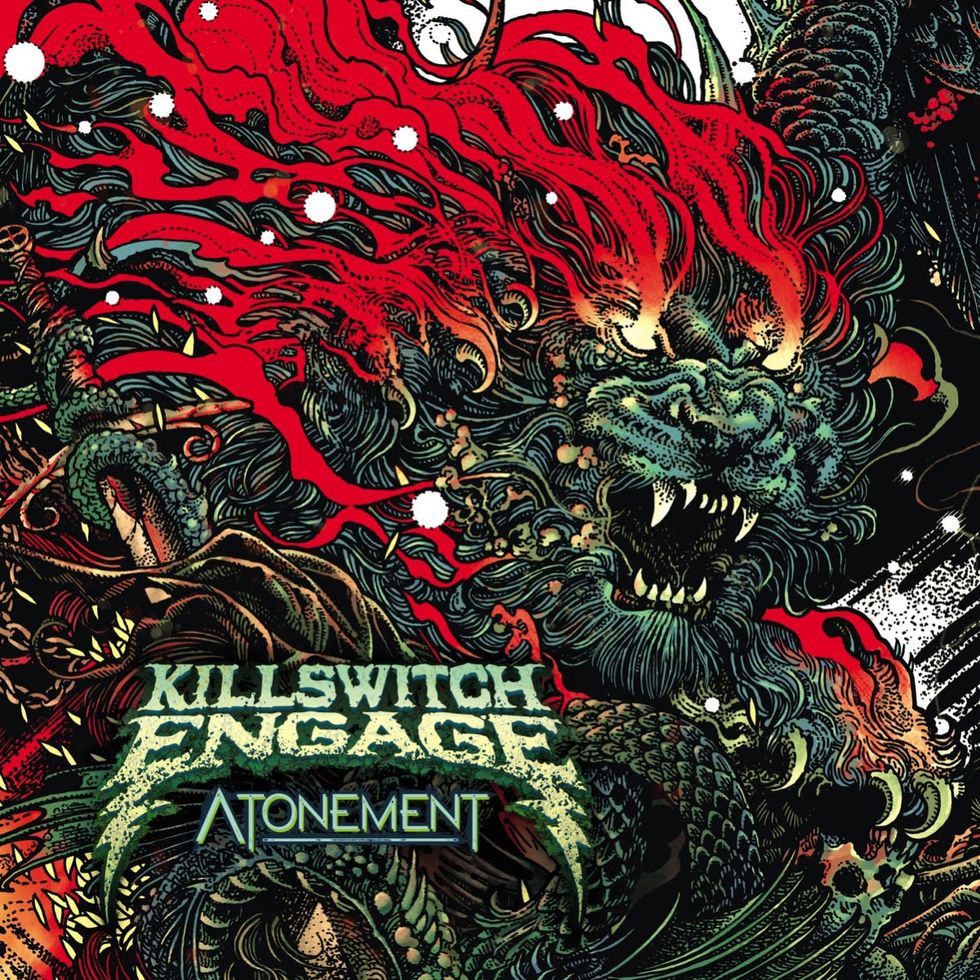
TIDBIT: Recording Atonement took more than three years due to factors such as vocal-cord surgery for singer Jesse Leach, and an interim tour with Iron Maiden.
Dutkiewicz: I don’t think of it like I’m the leader of the band. We’re all in it together, you know? I just feel like I’m probably the most driven in helping get the songs finished. It’s in my blood, versus how a lot of the other guys have trouble finishing ideas and sentences.
Stroetzel: Which I’m very jealous of. Me and Mike will come up with a lot of parts, and we tend to need each other’s help to piece it together and make cohesive songs. I’ll sit around and try to program drums for a song, and I’m not very good at that. Definitely helps to have a couple guys with drummers’ brains actually put in the right fills to make parts fit together.
It must also be nice not having to worry about being assigned a producer you might not like.
Dutkiewicz: Exactly. It’s always felt organic and homegrown with us.
Stroetzel: We’ve always been a pretty self-contained unit. Even the artwork—Mike’s done all the artwork for the band since the beginning. We don’t really have too many outside opinions coming in as far as the vision for the band.
What’s your favorite song on the album?
Dutkiewicz: I always say the one with [Testament vocalist] Chuck Billy, “The Crownless King,” just because I love his voice on that song so much. He’s been one of the greatest metal singers out there for so many years, so it’s just an honor to have him on the record. His voice is killer.
Stroetzel: Testament’s been one of my favorite bands since I was a kid, and I always loved Chuck’s voice, so it was really cool that he was able to sing on that. “The Signal Fire” is a fun one to play. Those are some of the ones we just introduced to set.
How do you feel about the album after letting it sit for a while?
Dutkiewicz: I haven’t listened to it since we made it—two years straight was enough. I’m excited that there’s a lot of people that are hearing it for the first time who like it. That’s the ultimate goal—trying to make our fans happy—and there are some songs on there that I’m proud of. I kind of don’t hate the first half of the record [laughs]. I think Jesse did a really good job, too. Lyrics can really make or break a song for me.
Killswitch Engage circa 2019, left to right: bassist Mike D’Antonio, drummer Justin Foley, guitarist Joel Stroetzel, singer Jesse Leach, and guitarist Adam Dutkiewicz. Photo by Travis Shinn
He made a point of addressing mental health issues with “I Am Broken Too.”
Dutkiewicz: It’s something that’s so easily dismissed in a lot of people’s minds. Especially me. Obviously everyone goes through hard times and depressing points in their lives, but I’m the kind of person who’ll just suck it up and not talk about it. When people get to that dark of a place, they should be talking about their feelings instead of harboring negative things.
Stroetzel: A lot of Jesse’s lyrics on this record are very honest. He kind of poured his heart out, and on that song in particular. When you’re on the road for a long time, people get down in the dumps. We’ve had friends and family members who have taken their lives over the years, and that song in particular was Jesse’s way of saying, “Hey, you know, mental illness is a real thing and we all suffer from it. There’s nothing to be ashamed of.”
It’s pretty common in the performing arts, too.
Stroetzel: Absolutely. You always hear about musicians and people taking their own lives. It’s a sad thing that so many people in the world think mental health or addiction is a choice. It’s not. It’s a real thing. I think it’s important for people to be aware of that.
How did each of you get into metal?
Dutkiewicz: It happened through my brother. He liked a lot of punk and hardcore. It started when I was 14, 15 years old, and just kind of took off from there. I got into the whole punk hardcore thing, which turned into metal. I like loud aggressive music, overall. It doesn’t matter if it’s metal, punk, hardcore, grind.
Stroetzel: I started playing piano when I was probably 7 or 8 years old. Then I was about 11 when I started getting into Metallica, Slayer, and Testament. I had a friend in middle school who turned me on to Testament. Before I knew it, I was asking my folks for an electric guitar. They finally got me one, and I couldn’t put it down. Getting my first distortion pedal was, like “Whoa, that’s how you make that sound? That’s just so cool!”
How did you go about learning how to play?
Stroetzel: I learned how to play by just learning stuff from those old records. I really liked the sound of palm-muting and downpicking. A lot of early Metallica and Testament had that fast downpicking right-hand stuff going on. As I got older, I got into a lot of classic rock: Hendrix, Zeppelin, stuff like that. Then I played in a high-school jazz band and a jazz combo in college, and went to Berklee for a semester right out of high school. I learned more about chord theory—what’s in key and what isn’t. It took me a while to get that stuff.
Dutkiewicz: I was completely self-taught. Just picked up a guitar and started teaching myself songs and went from there.
Who are your favorite guitarists?
Dutkiewicz: When I was growing up, I worshipped Eddie Van Halen and Angus Young. I loved those two guys so much. I don’t know what it was about Eddie Van Halen—just so out of control and crazy and awesome. I still carry his vibe with the way I play. I’d say one of the greatest metal guitarists out there nowadays is Jeff Loomis [of Nevermore and Arch Enemy]. He’s incredible. Oh my god. He’s beyond human. I don’t know how somebody sounds as good as he does. I guess lots of practice—that’s why I don’t sound nearly as good! [Laughs.] He’s one of the most impressive guys out there. Unbelievable.
Stroetzel: I always loved the James Hetfield picking hand. I love Stevie Ray Vaughan and guys like Warren Haynes, who just have really awesome vibrato. His tone, his feel, and his vibrato are all super smooth. I always tried to borrow a little bit from that. I love all the shredders, too. I remember hearing Yngwie Malmsteen for the first time and freaking out over how fast and clean he played, and trying to practice scale fragments and get the picking and fretting hands to line up. It’s still an ongoing struggle after all these years. That said, a lot of guys that Adam and I look up to are more blues-based, like Angus Young. I always loved George Lynch from Dokken. He’s one of those guys who can do a bluesy thing but he can shred, too.
How did studying the vibrato of players like SRV and Haynes affect your playing?
Stroetzel: It’s how you finesse the notes, like two vocalists would sing harmonies. On certain records you get to the chorus and the vocals sound huge, and you wonder why. It’s like, okay, there’s two or three harmonies stacked—you almost wouldn’t realize unless you took ’em out. Like “Oh, what happened, where’s all that richness?” We try to accomplish that with guitars, like two guitars singing as one. We try to get our vibratos and the way we pull the strings to line up with each other.

Guitars
Caparison Adam Dutkiewicz Signature TAT Special FX Metal Machine
Amps
Kemper Profiler PowerRack
Kemper Profiler PowerHead
Laney Tony Iommi 4x12 cabs
Effects
Maxon OD808
Boss NS-2 Noise Suppressor (studio)
Strings and Picks
In-Tune 1.14 mm Custom GrippX Xjw Jazz picks
Shure ULX-D wireless system
Planet Waves American Stage cables
Planet Waves woven straps
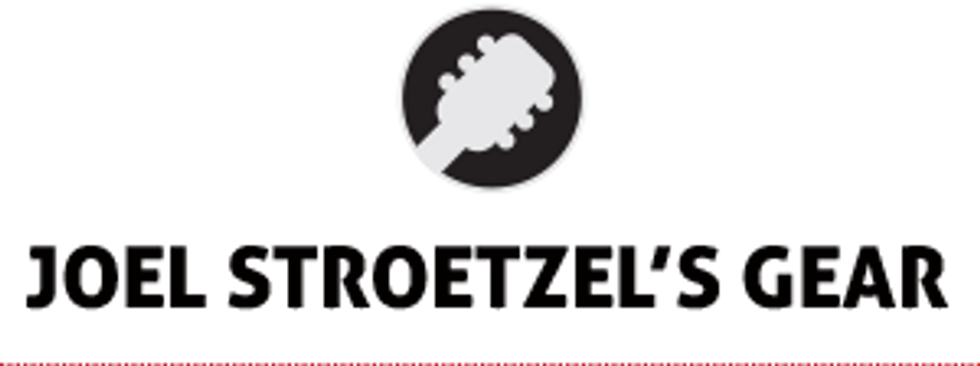
Guitars
Caparison Dellinger-JSM Joel Stroetzel Signature Model
Amps
Kemper Profiler PowerRack
Kemper Profiler PowerHead
Laney Tony Iommi 4x12 cabs
Effects
Maxon OD808
Maxon AD9Pro Analog Delay
Boss NS-2 Noise Suppressor (studio)
Strings and Picks
Planet Waves 1.14 mm Custom Black Ice picks
D’Addario EXL115 strings (.011–.049 sets)
Shure ULX-D wireless system
Planet Waves American Stage cables
Planet Waves woven straps
What’s the dynamic like between you two?
Dutkiewicz: I couldn’t do it without Joel. It would be next to impossible. We’ve literally been best friends for close to 25 years. He’s just an incredible dude. He’s that person where you have everything in common. I’m lucky to be able to have a job next to a person like that. It makes touring a lot easier.
Stroetzel: I started playing guitar with Adam while we were still in high school, in his old band Aftershock. We’ve learned to play tighter together over the years—even the way we feel certain riffs. I was always kind of behind the beat trying to feel it in a lazy, groovy way, and Adam was always aggressive and on time. I think he’s mellowed and I’ve gotten a little more on top of things. We kind of met in the middle with all that stuff. It’s become easier to play together, so that when we do get to rehearse or stand in a room and play together, we line up. It just happens naturally. He’s my musical brother.
Are you guys gearheads?
Stroetzel: Yeah, I’m a total gear nerd. I collect guitars and amps. I have a lot of stuff at the house, and a lot of it comes in handy when we’re recording. It’s nice to have tonal options as far as guitars and amplifiers. I’ve been using the same Caparison guitars for a long time—over 15 years. I really love the sound of those things, and Adam’s back with Caparison, too, over the last few years. They’re just really well-made guitars. They sound awesome. Itaru Kanno, who designs the guitars, is just an amazing dude. And Adam and I both have new signature models.
Dutkiewicz: No. Do I like playing nice gear? Yes, absolutely. But I’m not a collector like Joel. I just hold on to the things that I like.
What do you like about Caparison guitars?
Dutkiewicz: My signature guitar is just such a road machine. You can beat the hell out of it and it can take it. I love the neck design, I love the single [Fishman Fluence Killswitch Engage Signature humbucking] pickup. I love the frets, the fretwork. It’s just built for me.
Stroetzel: Their neck shapes are really comfortable. I used to play an Ibanez when I was younger, and I liked the thinner neck when I was learning, but the Caparison neck grips are a little rounder. I like being able to feel something in my hands when I play. They sound thunderous.The Fishman Fluence pickups are really responsive, and they have different modes where you can have a classic active pickup sound or, with a push-pull knob, you can get more of a passive, traditional humbucker sound. My guitar is the coil-tap, so you can get the signature coil-twang Tele-Strat kind of clean sound. It’s a really versatile guitar. I love everything about it.
How do you go about finding the right tone?
Dutkiewicz: It’s half your hands and half building your gain structure. We love using the Maxon OD808 pedals. And I still like my certain amps. I put that old Peavey 5150 on almost every record I do. And then there’s also an amp manufacturer we love now: KSR.
Stroetzel: Kyle Rhodes [of KSR Amplification], Mike Fortin [of Fortin Amps] … those guys are making great stuff, especially in the high-gain world. I still have a Soldano SLO-100 that I’ve had for many years. I love that. The Laney Tony Iommi model that they did a few years back is killer. In addition to that, I’ve got a few Fugue amplifiers—another great amp builder. The Maxon OD808 has been one of the biggest parts of our sound, pedal-wise. We have it on at all times for dirty tones. It compresses the output of your guitar a little bit: It tames any flubby low-end and gives you a nice thick attack, so everything seems to cut better in the mix. The Maxon delay pedals are great, too, and the compressors are clean. For a while we’ve been using the Boss NS-2 Noise Suppressors. We always have those running in the studio when we’re tracking.
What do you bring on the road?
Stroetzel: Lately we’ve just been using our Kemper [Profilers]. We can profile the sounds we get in the studio and they’re easy to recall live. Part of me would love to have a big tube stack behind me, kicking me in the chest when I turn around. But, at the same time, the Kemper’s so convenient. We’re all on in-ear monitors, so it’s really nice to be able to plug in and there’s no issues with mic placement. Our front-of-house guy has a direct clean line to the guitars that doesn’t bleed.
Following the upcoming tour, what’s next for the band?
Stroetzel: We do have some extra songs from the last session kickin’ around. There’s talk of maybe doing another release in the next year or so, but I’m not sure if it’ll be a full-length record or just an EP. Maybe in a year we’ll talk about getting back in the studio. Hopefully it won’t be three years before we make another.
Adam Dutkiewicz, Joel Stroetzel, and the rest of the Killswitch crew perform the opening track from Atonement at an August 2019 show in Las Vegas.




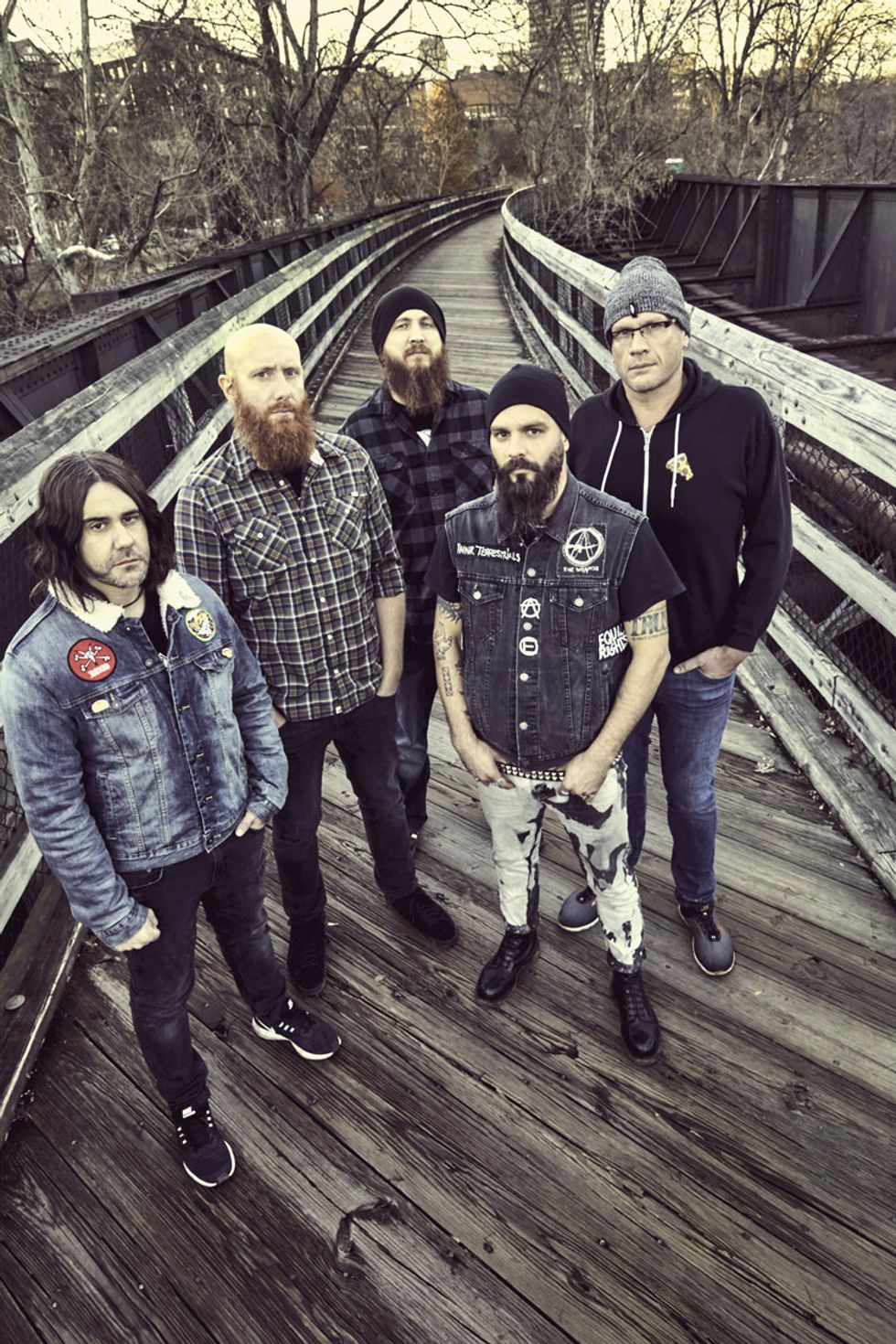







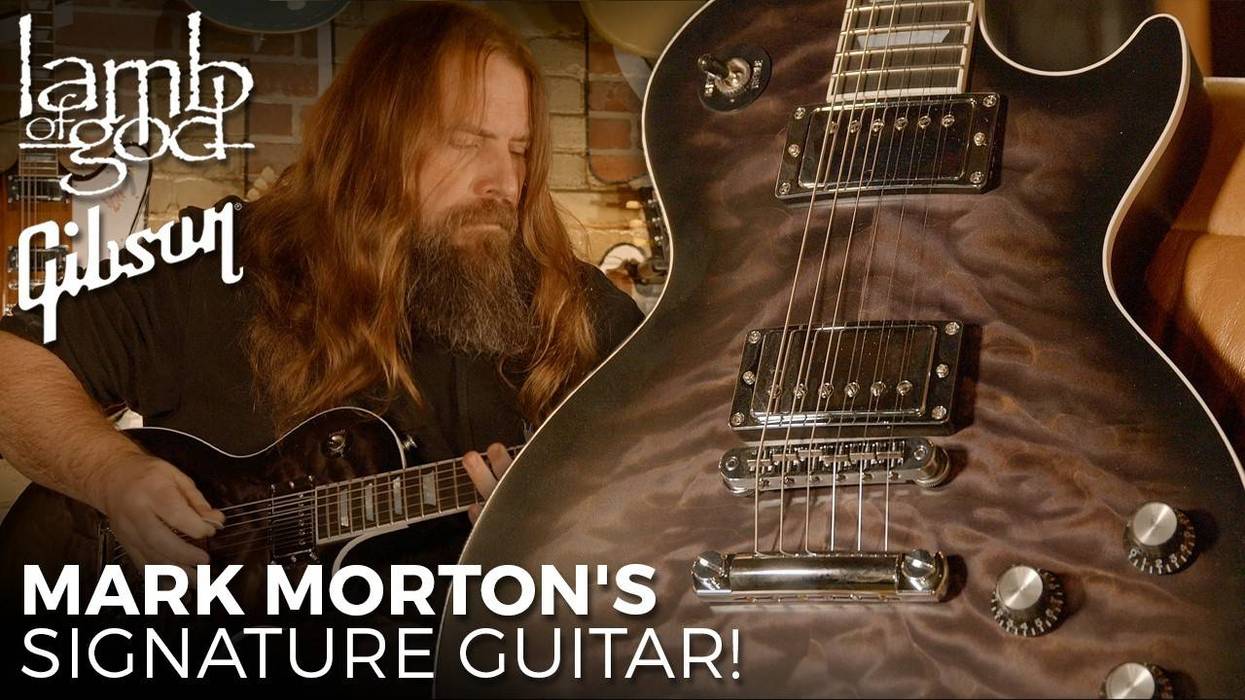
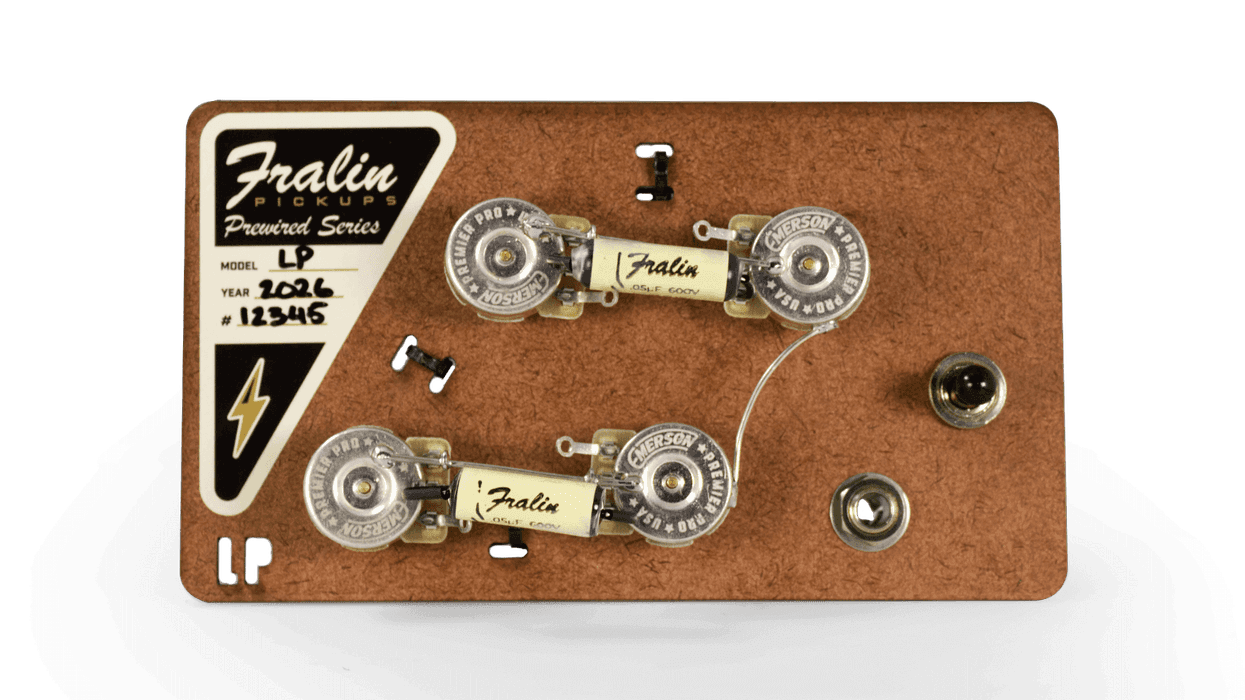


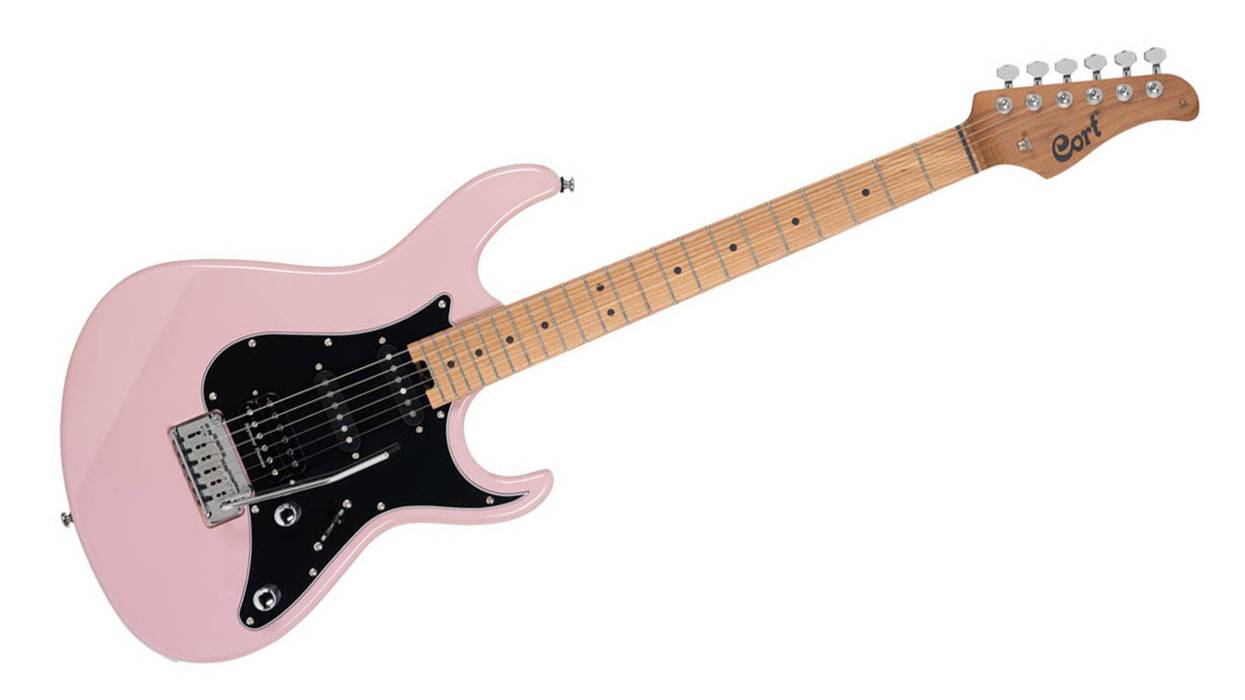
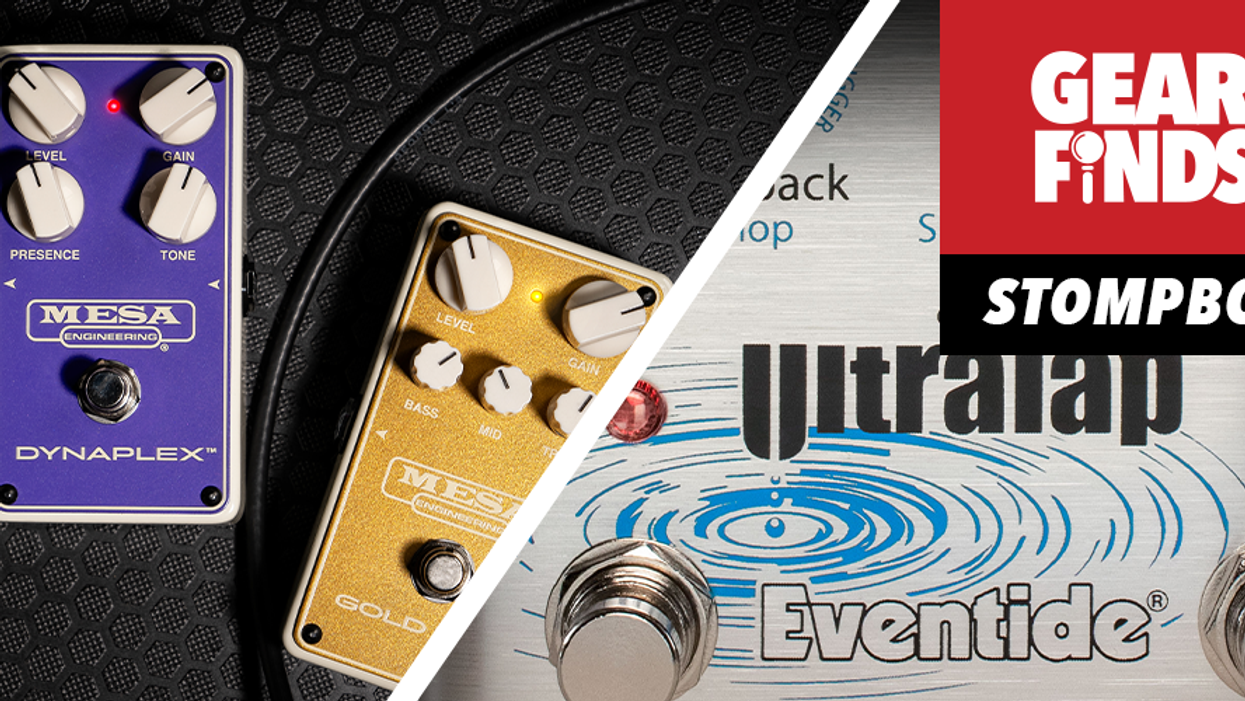

![Rig Rundown: Russian Circles’ Mike Sullivan [2025]](https://www.premierguitar.com/media-library/youtube.jpg?id=62303631&width=1245&height=700&quality=70&coordinates=0%2C0%2C0%2C0)
















![Rig Rundown: AFI [2025]](https://www.premierguitar.com/media-library/youtube.jpg?id=62064741&width=1245&height=700&quality=70&coordinates=0%2C0%2C0%2C0)











